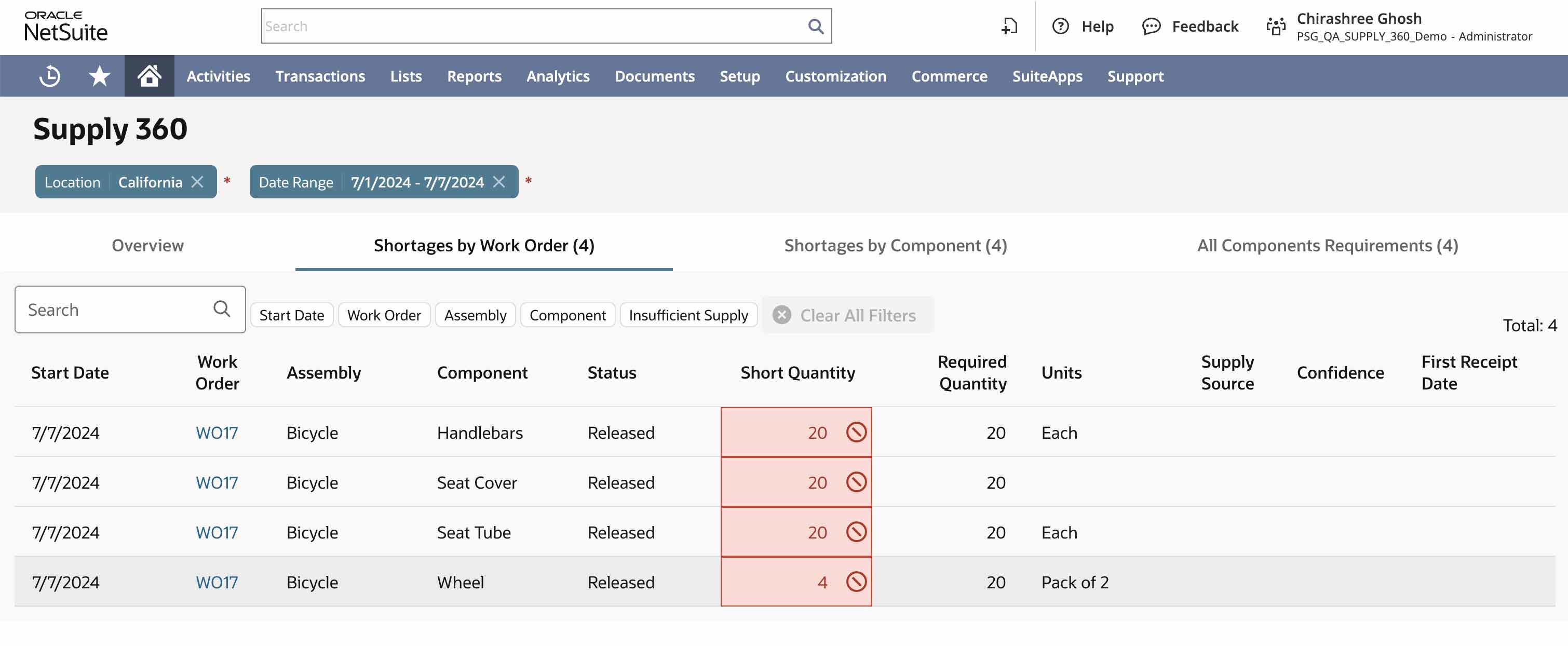With the latest release of NetSuite, manufacturers can quickly compare the work orders that a factory needs to fill against the parts inventory on hand at that location so they can see any shortfalls or overstocks in one simple table.
This is just one example of the kind of insights and efficiency gains NetSuite 2024 Release 2 delivers across manufacturing, warehouse, and supply chain operations. Manufacturer optimism is on the rise, with nearly 70% of manufacturers saying their company has a positive outlook, according to the National Association of Manufacturers. But products businesses still need new tools that can help make their workforce more productive and reduce excess inventory. NetSuite 2024.2 brings a host of new applications and features designed to help companies across industries deliver on this goal.
New SuiteApps Align Supply and Demand, Monitor Costs
NetSuite 2024.2 includes three new SuiteApps that can assist manufacturers in controlling costs and proactively responding to potential component shortages.
The application noted earlier, NetSuite Supply 360, makes it easier for production planners and managers to see if they have all the inventory needed to fulfil upcoming work orders. The new SuiteApp filters work orders by location and date and compares that to the location’s on-hand and on-order inventory to highlight potential component shortages in an easy-to-understand table. Managers can view shortfalls by assembly, individual component, or work order.

Another SuiteApp, NetSuite Available to Build, shows manufacturers how many of an assembly they can make with current available inventory. Available to Build can evaluate both final assembly and subassembly components so that, with just a few clicks, manufacturers can determine what they can promise to customers. Managers can access this report from the sales order entry, bill of materials inquiry, and Item 360 pages.
Cost Variance Analysis is a third new SuiteApp that compares the planned and actual costs of work orders in a simple report. The tool highlights lower-than-expected costs in green and higher-than-anticipated expenses in red, displaying variances in both dollars and as a percentage. Production managers can click through the cost variance report to see how specific components, categories of costs, and conversion costs impacted the final cost.
Increasing Efficiency and Reducing Waste in the Warehouse
Several new features in NetSuite Warehouse Management System (WMS) and NetSuite Ship Central help warehouse staff get orders out the door faster and more cost-effectively while reducing lost inventory and orders.
Warehouse managers can spend less time ensuring shelves and bins are well-stocked with the ability to automatically schedule stock replenishment tasks for their employees in NetSuite WMS. Rather than requesting bins be restocked one by one, WMS Bin Replenishment Schedule lets managers filter inventory by item, item family, item group, item classification, or a specific saved search to schedule replenishments. In another boost to warehouse productivity, employees can capture serial numbers for each product in a pallet of goods in NetSuite WMS with a single scan during the receiving process.
Managers can also quickly see what orders never made it out the door with a new report that shows failed pick tasks. The report includes all the details of the failed pick so they can dig into the source of the problem.
In the latest version of Ship Central, order pickers no longer have to search for the cheapest shipping option because the application can automatically choose the most cost-effective option that will deliver the order to the customer by the promised date.
Warehouse staff also benefit from expanded label printing capabilities in Ship Central. Businesses that want to include return shipping labels in outbound orders to make returns easier for customers can quickly print these return labels and select a different shipping method than what’s used on the outbound label—a cheaper option, for example. New advanced options in the app also let pickers customise labels to send hazmat items through USPS and DHL, ship alcohol, collect cash on delivery, and include trade codes, content explanations, and declarations for international shipments.
As product companies continue to focus on minimising unnecessary costs, they may move from periodic inventory counts to more frequent cycle counts. Warehouse employees can now generate, start, and complete planned cycle counts from the WMS mobile app, saving them extra trips to a desktop during counts.
Other New Features
NetSuite Supply Chain Management (SCM) Mobile
- Data tables in the SCM Mobile app showing work orders, sales orders, or other records can now be colour-coded based on status, with green, yellow, and red signifying fulfilled, in process, and delayed orders.
- The ability to organise printers into groups in NetSuite SCM Mobile makes it easier for warehouse workers to always use nearby printers and not mistakenly send jobs to printers on the other side of the warehouse.
- Files and images can be uploaded to any custom record in NetSuite 2024.2 rather than just standard record types.
NetSuite Manufacturing Mobile
- Manufacturing Mobile will automatically populate lot and serial numbers when scanning GS1 barcodes, saving businesses that use these unique identifiers valuable time. In addition, Manufacturing Mobile can automatically generate lot numbers through an integration with the Lot Auto Numbering SuiteApp.
- To strengthen manufacturing controls, managers can require the assigned employee to swipe their badge to start and end any step in the manufacturing process, such as operating a machine. This also allows for more precise tracking of who completed each step and how long it took them.
NetSuite Quality Management
- NetSuite Quality Management now offers enhanced controls that allow only the assigned employee to complete the inspection and prevent other employees from changing inspection data after it’s complete.
- Quality managers can now choose both the transaction type (such as item receipt or item fulfilment) and the parent transaction (such as purchase order or transfer order) that trigger inspections. This allows you to be more selective about what ends up in your inspection queue and prevents unnecessary inspections.
- A new Quality subtab within various NetSuite transactions makes it easy to monitor the status of different inspections. The system also includes links to inventory transaction records so you can quickly view other product details.
- You can now schedule inspections for items sold by quantity, such as pounds or feet.
Supply Planning
- Minimum order quantity no longer acts as your lot size when using the supply planning functionality within NetSuite Material Requirements Planning (MRP). This ability to choose different numbers for minimum order quantity and lot size gives supply chain managers more flexibility when planning purchase orders. For example, if your order minimum is 12 but you produce in multiples of six, you can adjust plans in multiples of six instead of 12. This minimum quantity can also be paired with fixed lots, fixed lot multiples, and periods of supply. If you sell in lots of 10, for instance, but the minimum order quantity is 20, you could set the minimum fixed lots at two.
- The latest release extends demand planning horizons and purchase lead times from one year to three years.
- The Supply Planning Workbench includes separate filters for firm and unfirm supply orders in the 2024.2 release. This helps supply chain managers better see how changes to unfirm orders—those which have not yet been placed—will impact the overall plan.
Award Winning
Cloud Inventory
Learn More About All the Updates in NetSuite 2024.2
This is just a summary of some of the game-changing features in NetSuite 2024 Release 2. Read more about what is in the release on our Sneak Peek page or dive deep into the release notes. Most importantly, don't forget to request your Release Preview test account so you can get hands-on access and see how new features will work with your data, workflows, and customisations.
The preceding is intended to outline our general product direction. It is intended for information purposes only, and may not be incorporated into any contract. It is not a commitment to deliver any material, code, or functionality, and should not be relied upon in making purchasing decisions. The development, release, timing, and pricing of any features or functionality described for Oracle’s products may change and remains at the sole discretion of Oracle Corporation.









